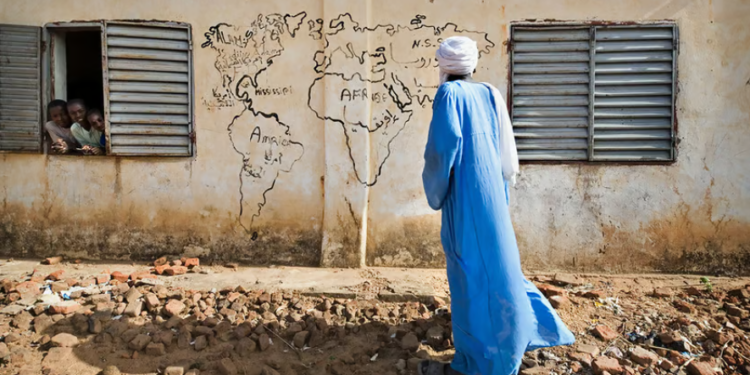Jan 20, 2025 Story by: Editor
A Pivotal Time to Be African
The present era offers unprecedented opportunities for those born in Africa. Since 1960, the continent has seen life expectancy surge by over half, rising from 41 years to 64. Child mortality rates have plummeted, with the proportion of children dying before their fifth birthday dropping by three-quarters. University attendance among African youth has increased ninefold since 1970. African culture has also gained global recognition, with authors from the continent securing prestigious awards such as the Booker Prize, Prix Goncourt, and the Nobel Prize for Literature in the 2020s. Additionally, this year marks the first G20 summit hosted in Africa, specifically in South Africa—a testament to the continent’s growing prominence.
Never before in human history have so many people been born African. The population across Africa’s 54 nations has doubled in the last 30 years, reaching 1.5 billion, and the UN projects it will double again by 2070. This population boom is already shaping the region’s dynamics. Political parties rooted in 20th-century independence struggles are losing traction among younger, more educated, and digitally savvy Africans. Over the past decade, nearly 30 incumbent leaders have been defeated in general elections.
Transformation Without Economic Progress
While Africa undergoes significant social change driven by demographics, urbanization, politics, and technology, economic progress has not kept pace. African economies continue to lag further behind global standards. In 1960, Africa’s GDP per capita, adjusted for purchasing power parity (PPP), was half the global average. Today, it stands at just a quarter. Once on par with East Asia, the region now sees East Asian incomes outstripping sub-Saharan Africa by a factor of seven. This widening gap is described by Jakkie Cilliers of the Institute for Security Studies as resembling “the jaws of a yawning crocodile,” with one line rising steeply while the other remains flat.
This growing economic disparity is among the most pressing issues of the 21st century, alongside climate change and nuclear threats. Projections indicate that by 2030, over 80% of the world’s poorest people will reside in Africa, a steep rise from 14% in 1990.
Missed Opportunities Amid Real Progress
The early 21st century held promise for Africa, moving from being labeled the “Hopeless Continent” by The Economist in 2000 to celebrating “Africa Rising” by 2011. However, this period of growth proved short-lived and modest. During the economic boom of 2000–2014, Africa’s GDP per capita grew at an annual rate of 2.4%, yet other developing regions grew at more than twice that rate, generating far more jobs. Since then, incomes have stagnated. The World Bank has referred to this period as “a decade of futility in economic performance” for sub-Saharan Africa.
There are growing concerns that Africa may have missed a critical window of opportunity. The 2000s were characterized by Chinese demand for African commodities and the benefits of globalization. Debt forgiveness initiatives allowed governments to invest in education, infrastructure, and other sectors. However, not all opportunities were squandered. Abebe Selassie, head of the IMF’s African department, emphasizes the continent’s progress compared to previous decades. Reflecting on the transformation of cities like Accra, Kampala, and Addis Ababa, Selassie remarked, “If anybody had said to me then that Accra, Kampala and Addis would, 30 years on, look anything like what they do today, I would have thought they were under the influence of more than just a cup of strong Ethiopian coffee,” during a speech in July.
Successes and Lingering Challenges
Some African countries have experienced consistent economic growth over the past six decades. Nations such as Botswana, Mauritius, and Seychelles have maintained GDP growth rates comparable to the global average. More recently, countries like Ivory Coast, Ethiopia, and Rwanda have achieved remarkable economic progress. Yet these successes remain exceptions. Major economies such as Nigeria, South Africa, and Egypt have underperformed, and the dual shocks of the COVID-19 pandemic and the war in Ukraine have only exacerbated these challenges. Even before these crises, some experts, including World Bank Chief Economist Indermit Gill, questioned whether Africa had “missed the bus.”
Persistent poverty and sluggish productivity growth hinder the continent’s potential to transform its youthful population into a catalyst for change. Mavis Owusu-Gyamfi, president of the African Centre for Economic Transformation, stresses the urgency of creating employment opportunities: “We have to create jobs for our young people. They can’t keep being labeled an ‘opportunity’ that is never realized.” Sir Mo Ibrahim, a Sudanese-British businessman, warns that unmet expectations among young Africans “fuel frustration and anger, the best triggers for unrest and conflicts.”
The Path Ahead
Robust economies are crucial for fostering stability and addressing global challenges like climate change. Africa is disproportionately vulnerable, with 17 of the 20 nations most at risk from climate change located on the continent. In 2024, the El Niño weather pattern highlighted the precariousness of African agriculture, as floods displaced four million people and forced school closures. A report from the UN Economic Commission for Africa estimates that African nations allocate up to 9% of their budgets to address such climate shocks. Research by Philip Kofi Adom for the Centre for Global Development predicts that if global temperatures rise more than 2°C above pre-industrial levels, African crop revenues could decline by 30%.
Despite these challenges, the structural foundations needed for sustainable growth remain weak. According to the IMF, around half of Africa’s nations face significant macroeconomic imbalances, including inflation exceeding 50%, high fiscal deficits, and unsustainable debt burdens.
Conclusion
Africa stands at a critical juncture. The continent’s youthful population and cultural vitality offer immense potential, but unlocking this requires urgent economic reforms and investments in infrastructure, education, and job creation. Without these changes, the world’s youngest continent risks remaining its poorest.
This version retains the article’s meaning while improving readability and flow. All original quotes and their sources are included as-is. Source: The Economist

















